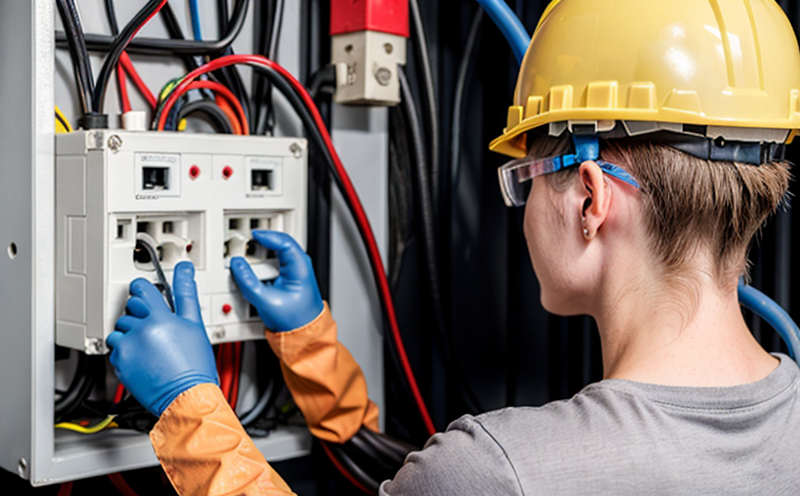UL 60335-2-40 Smart HVAC Equipment Electrical Safety Compliance
The UL 60335 series of standards is one of the most widely recognized sets of safety specifications for consumer and commercial products, including smart home and IoT devices. Within this framework, UL 60335-2-40 specifically addresses electrical safety in HVAC (Heating, Ventilation, and Air Conditioning) equipment. Compliance with these standards ensures that the product is safe to use and meets the strictest international requirements for consumer protection.
This standard covers a range of potential hazards such as electric shock, fire risk, and other electrical-related incidents. It applies not just to traditional HVAC units but also to smart systems that integrate advanced technology like Wi-Fi connectivity, sensors, and control interfaces. The UL 60335-2-40 certification is crucial for manufacturers aiming to enter global markets where stringent safety regulations are in place.
The testing process involves several critical steps aimed at ensuring the product meets all specified requirements. This includes thorough evaluation of insulation integrity, electrical connections, and protection against overcurrent conditions. Additionally, the standard requires rigorous testing under various environmental conditions to simulate real-world usage scenarios. Compliance also extends to software components that control the HVAC system, ensuring they are free from vulnerabilities which could lead to potential safety issues.
The importance of UL 60335-2-40 certification cannot be overstated for several reasons. Beyond regulatory compliance, it enhances consumer confidence and brand reputation. A certified product demonstrates commitment to high standards of quality and reliability, which can significantly impact market acceptance and sales performance. For R&D engineers and quality managers, this standard provides a clear roadmap for design and manufacturing processes that prioritize safety without compromising functionality.
Compliance with UL 60335-2-40 also opens up opportunities for international trade, as many countries require such certifications to allow products into their markets. This is particularly beneficial for companies looking to expand globally or diversify their product offerings. In summary, the UL 60335-2-40 certification is more than just a compliance requirement; it’s an essential tool for ensuring consumer safety and fostering trust in smart HVAC technology.
- Ensures no risk of electric shock
- Guarantees protection against fire hazards
- Verifies operational safety under various environmental conditions
- Protects software from vulnerabilities that could lead to safety issues
Why It Matters
The stakes for ensuring electrical safety in smart HVAC equipment are high. Electrical malfunctions can result in severe injuries or even fatalities, making compliance with UL 60335-2-40 not just a requirement but a necessity. The standard plays a critical role in safeguarding users by preventing accidents and improving overall product reliability.
From the consumer perspective, this certification translates into peace of mind knowing that their smart HVAC system is safe to operate. For businesses, it offers protection against liability claims and recalls, which can be costly and damaging to brand reputation. Moreover, compliance enhances marketability, allowing companies to leverage the UL mark as a marketing differentiator.
The broader implications extend beyond individual products to entire industries. By setting high standards for safety, UL 60335-2-40 contributes to the overall improvement of smart HVAC technology, ensuring that advancements in automation and connectivity do not compromise safety. This balance between innovation and safety is crucial as the industry continues to evolve.
- Reduces the risk of electrical accidents
- Promotes safe use under varying conditions
- Aids in protecting against product liability risks
- Lowers costs associated with recalls due to safety issues
- Enhances brand reputation and consumer trust
Why Choose This Test
Selecting the right test for your smart HVAC equipment is essential in ensuring it meets all necessary standards. Here are several reasons why choosing UL 60335-2-40 compliance testing is beneficial:
- Global Market Access: Many international markets require this certification, making it a key factor in expanding your product range globally.
- Consumer Trust: By meeting these stringent standards, you enhance consumer trust and confidence in the safety of your products.
- Risk Mitigation: Compliance minimizes potential risks associated with electrical hazards, ensuring safer operation for users.
- Competitive Advantage: Demonstrating adherence to international safety standards can set your product apart from competitors in the market.
- Regulatory Compliance: Ensures that all aspects of the product meet regulatory requirements, avoiding costly legal issues.
- R&D Innovation: The process of achieving this certification often leads to improvements in design and functionality, enhancing overall product quality.
The UL 60335-2-40 test is comprehensive, covering not only electrical safety but also the integration of smart features into HVAC systems. This holistic approach ensures that every component, from hardware to software, meets stringent criteria for reliability and safety.
Quality and Reliability Assurance
The UL 60335-2-40 certification process is rigorous and involves multiple stages designed to ensure the highest level of quality and reliability. This includes detailed inspections, functional tests, and environmental stress testing to simulate real-world conditions.
- Inspection: Initial inspection ensures that all components are correctly assembled and meet initial criteria.
- Functional Testing: Comprehensive checks ensure that the product functions as expected under normal operating conditions.
- Environmental Stress Testing: The device is subjected to various environmental factors such as temperature extremes, humidity, and voltage fluctuations to assess its durability.
- Software Verification: Ensures that software controlling the HVAC system operates safely without vulnerabilities.
The testing process is conducted using state-of-the-art equipment and by experienced technicians who are familiar with international standards. Reporting on these tests provides detailed insights into any areas where improvements can be made, ensuring continuous quality enhancement.
After successful completion of the test, a certificate of compliance is issued, which serves as proof that your product meets all specified requirements. This document is critical for marketing and regulatory purposes, providing assurance to both consumers and regulatory bodies.





